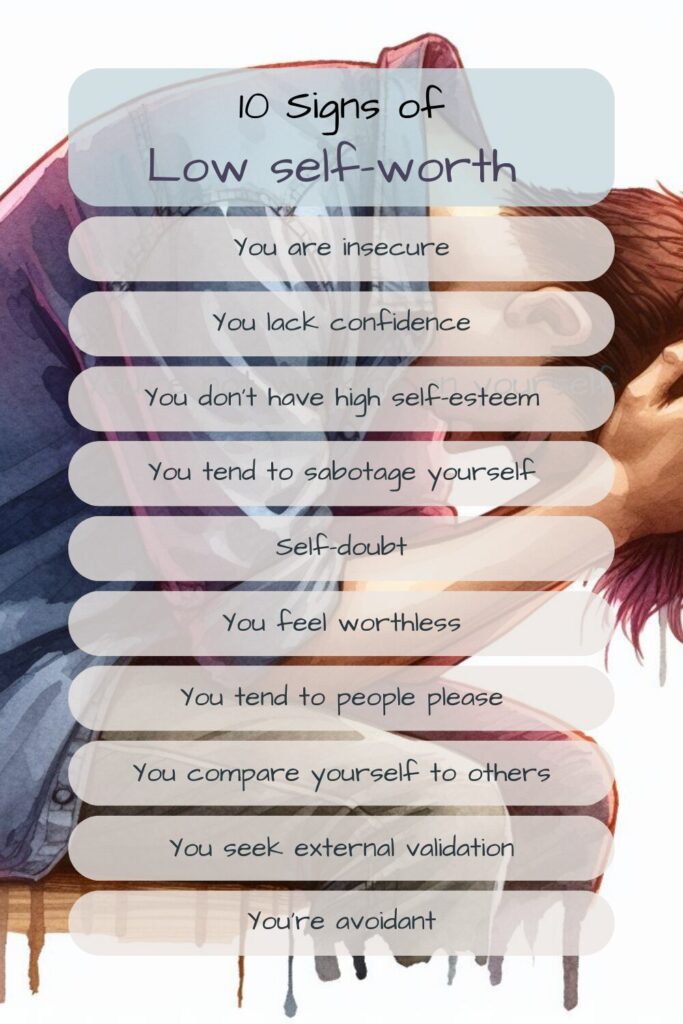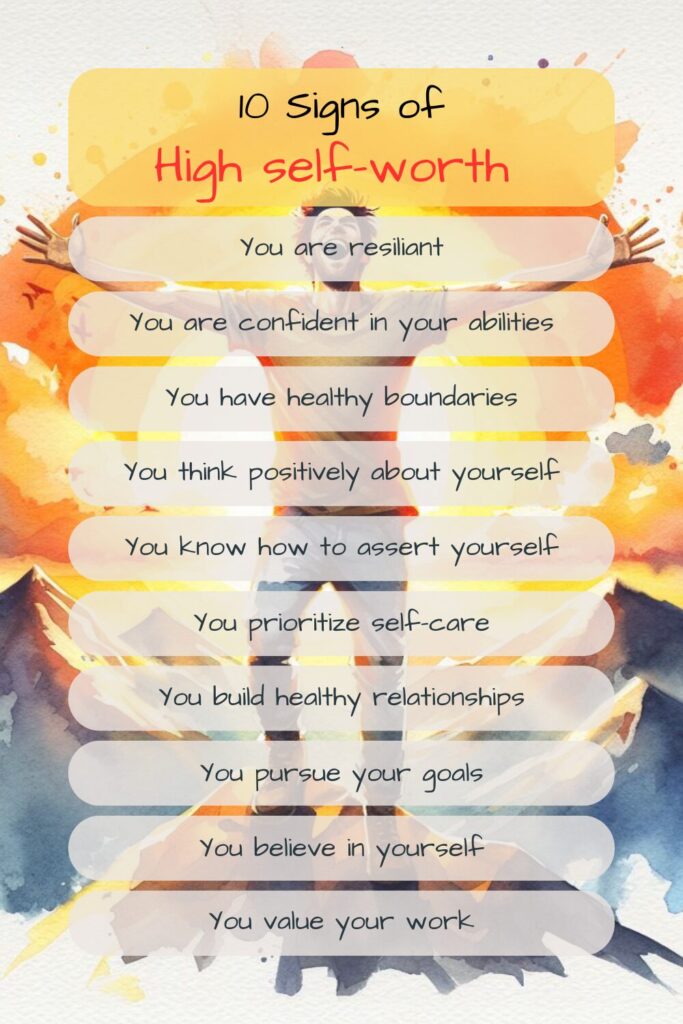Do you feel like you’re just never good enough? No matter how much you do, you’re constantly back to square one with nothing to show. You feel like a letdown, a failure, a loser. But despite how much judgment you get, nothing quite sizes up to the disappointment you have for yourself.
Many of us have self-worth issues that prevent us from achieving our potential because we believe we are not worthy of winning. This is a problem because feeling like you’re never good enough prevents you from trying in the first place.
But the only obstacle you have is the one in your mind. How hard you try is one thing but without self-belief, you bow out of the race before it has even begun.
With that said, here are some ways to boost your self-worth, to feel like you can take on the world and win.
Because you can.
Why is high self-worth so important?

Self-worth is the belief that you deserve love, care, and respect. It is to value yourself and realize that you are as important as anyone else. As self-worth is connected to confidence and self-esteem, a healthy sense of self-worth allows you to feel good in yourself.
Think of self-worth as your internal compass that guides how you see yourself, and how you fit into the world.
Having high self-worth is about knowing that you’re important and that you deserve the things you want in life. Not only are you deserving, but there’s no reason why you can’t achieve those things too.
When your self-worth is high, you feel confident, handle challenges better, and build healthier relationships. Likewise, you’re better at getting somewhere in life because you believe in yourself and value your work.
On the flip side, when your self-worth is low, it means you don’t value yourself. As a result of not valuing yourself, you feel less confident, insecure, and disempowered. You push opportunities away because you feel like you’re not good enough to handle them, or that you don’t deserve them.
In this sense, low self-worth can lead to self-sabotage and self-victimization because you won’t take what you deserve. You can learn more about this in the article below:
In a world that tells us we’re only as good as the number of likes we have on social media, it’s important to remember that your worth isn’t based on your external condition.
Even though it’s okay to have moments when you’re not feeling so hot, it’s important not to get stuck there, and take steps to make yourself feel more important.
Let’s distinguish low self-worth and high self-worth in the images below:
What causes low self-worth?
There can be quite a lot of different factors that contribute to low self-worth. Sometimes it’s linked to experiences from the past, like being constantly criticized or constantly failing at something. Traumatic events, especially in childhood, can really impact how we see ourselves too.
But it’s not just about what happens to us. How we interpret these events matters too. If we constantly compare ourselves to others or have really high expectations that we can’t meet, it can chip away at our self-worth.
Other people imposing their expectations that are too much can also be a cause. When I was a teacher in Vietnam, I saw this a lot among the students. In Vietnamese culture, parents often have super high expectations for their kids, and they all expect their kids to be on top of the class.
Of course, not everyone can be on top of the class, otherwise, everyone would be average. But since those students were letting down their parents (and I imagine many of them were pretty badly punished by them), the expectations of their parents affected many of my student’s self-worth.
Trauma and deep-rooted issues such as core shame can also cause self-worth issues. You can learn more about that below:
With that said, our relationships also play a big role. Being in toxic relationships or hanging around people that put us down can seriously affect how we see ourselves. Even if it’s not intentional, the way others treat us can shape our self-worth.
There’s also this thing called our inner critic. You know, that voice in our head that always points out what we did wrong or why we’re not good enough? That little voice can be super powerful in influencing our self-worth.
These are just some pieces of the puzzle, but everyone’s story is unique. The causes of low self-worth can be a mix of experiences, thoughts, and relationships that shape how we view ourselves.
How to build your self-worth

After going through what self-worth is and why it’s so important to improve it, let’s get into the good stuff. Here are some suggestions to build your self-worth if you’re struggling with low self-worth issues.
Stop comparing yourself to others
A lot of pain is created through comparison. If you feel like you’re not where you want to be in life, you might notice that you tend to evaluate yourself depending on what other people have (or what they seem to have).
You see a happy couple and feel miserable because you’re not in a relationship. Even if you are in a happy relationship, you might see happier people, who look more successful, or who love each other more. Then you see someone who is wealthy, and you feel like a loser because you’re struggling to make so little.
But it’s all a trap.
There’s always going to be someone who has something you want. There’s always going to be someone who dwarfs your efforts. If you need to be the best, you’re always going to lose.
That’s the thing.
You don’t see these people’s lives behind the curtains, you’re just assuming all is good when I’m sure there are things that you have, internal or external, that they would want too.
As long as your sense of self comes from a competitive position where you feel you should be doing better than others – You’re always going to feel unworthy.
That’s why it’s important to stop comparing yourself, and instead focus on your progress. As long as you focus on your progress and what you can do now – you’re going to feel a lot better about yourself.
Watch the negative self-talk
When you feel like you’re not good enough, it becomes very easy to criticize yourself. With that said, self-criticism is usually an unconscious process, and it’s something that you need to look out for.
You blame yourself for not living up to who you want to become. You berate yourself, pity yourself, and probably sabotage yourself too, because you feel like you’re worthless.
Therefore, if you want to build your self-worth, you need to start drilling in more positive ways of talking about yourself. Make sure that you are growth-oriented which will give you valuable feedback about how to continuously improve.
Visualize a powerful you!
Visualization techniques can be powerful to create a healthier framework of your actions, behaviors, or self at large!
Mental rehearsal can also be a useful technique that allows you to picture yourself with more value. This essentially paves the road by accurately envisioning any particular reality and regularly feeling into it to embody it.
If you’re bashing yourself for not being good enough, you’re just going to feel worse every time you do. So be conscious of it. Every time you catch yourself putting yourself down, stop yourself in your tracks. Replace the negative self-talk with something productive, and think about how you can change the expression to be on your side.
Focus on where you are right now
Your fixation on the future is a big reason why you feel insufficient. Let’s face it, your present situation might not be perfect, but it’s good enough. If you were to actually sit with yourself and stop thinking about the future, or the past, you would probably feel a whole lot more content with your current circumstances.
The future can create a lot of stress when you’re too fixed on it. You’re always thinking about why you need to improve your situation, what you’re doing wrong, how you can be better…
Exhausting isn’t it?
But when you learn to drop into your body more and just allow the experience of consciousness to be what it is, you don’t suffer. That’s why it’s important to just enjoy life for what it is. Be present and allow it to take you where it will.
Look at how far you've come
If you’ve been on the personal growth journey for some time, your reality has probably become a very different place. Not to say that there aren’t still challenges, but sometimes you just need to appreciate how far you have come.
When you’re getting bogged in self-pity, think about all the different things you have done. Think about the things that did work out for you, the adventures you have been on, the memories you have. You have gone through a lot. Sometimes you just need to give yourself some credit, and put it all into perspective.
If you feel you haven’t come far and have nothing to smile at (which I’m sure you do), it’s either because you just don’t see it, or it’s because you haven’t put in the effort.
Look at your core beliefs
These feelings of not being good enough likely come from persistent, core beliefs. We all carry around core beliefs that were cultivated throughout our childhood, our life experiences, society, and the culture we live in.
But without being aware of these deep-rooted influences, they run your life for you. Feeling insufficient could be the result of outdated programming.
For example, we place a huge emphasis on our work in Western society, and people tend to base their self-worth on it. You might feel proud if you’re a successful doctor, but you might feel ashamed of yourself if you’re a 40-year-old bartender.
By really digging into your core beliefs and discerning what is authentic, and what you’ve just picked up as a byproduct, you can see whether your self-worth issues are justified.
Exercise self-compassion
Maybe people just didn’t care enough, but if you’re expecting others to come in and save the day, it might just lead to a whole lot of hurt.
So you need to be there for yourself. This is where self-compassion comes in. If you visualize yourself being there for yourself, it can actually make you feel a whole lot better. I suggest giving it a try.
To learn more about using this self-compassion technique, check out the article below:
Learning to value your work more

The internal work is only half the job of building your self-worth. After looking at how to change your perspective to feel better about yourself, now let’s look at things you can practically do to create a life that you’re proud of.
Take accountability for your progress
You need to be honest with yourself. Are you doing everything you can to create a great life for yourself? Are you honestly doing everything in your power to change? Don’t just say you are when you’re spending hours every time watching Netflix.
If you feel like there are things that could be improved, it’s your responsibility to improve them. Whether this comes to improving your life condition by working harder at your avocations, putting in the time to learn new things, or developing the outlooks you need to feel complete, everything in life requires some work.
So don’t make excuses and put your growth off. Write down what you need to do. Take steps to improve those areas and hold yourself accountable for your progress. With the right mentality, you will see that you can achieve whatever you put your mind to, you just need to start walking the talk.
Read the article below to dig into self-accountability:
Create goals and track your progress
It’s good to have some structure in your life.
You need to build a solid plan of what you need to do, to get where you want to go. Especially when you’re feeling low, it’s easy to get trapped in the cycle of non-action.
Write everything you want to achieve down. Set reasonable goals, daily – weekly or monthly, and take little steps – every day. These steps could be watching a tutorial about something you want to learn. Completing a couple of tasks for your business or avocation. Hitting a milestone in your practice of something you enjoy doing.
By adding some structure to your life, you’re giving yourself a ladder to climb. This way you can be sure you’re always making progress in your life, which is going to help with those feelings of not being good enough.
Strive to do big things, but don't base your self-worth on it
A sense of purpose is a great propeller in life. With a sense of purpose, you will feel more motivated, and that motivation will drive you to accomplish more. By accomplishing more things, you’re bound to feel better about yourself, because you feel like you’re progressing.
It’s good to have big goals and to want to take on the world, but sometimes when we get too closely attached to a particular outcome, our self-worth becomes dependent on it.
That’s why it’s important to go after the things you want, but if it’s slow going, don’t be hard on yourself.
Just by trying you’re already a winner, and the act of trying will help you value yourself more.
What interests you? Refine what you want in life by following your passions and keeping your eyes on the prize. Take small steps often towards larger goals.
Stop waiting for things to change, take action
Stop waiting around for things to change if you don’t like your current circumstances, and start taking action. When you take your learning curve into your own hands, it gives you an enormous sense of satisfaction.
If you don’t take action, nothing’s going to change. Stop waiting for something better to come along, and start making it happen. Take more of a proactive stance, and drive the change you’re looking for.



